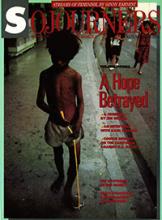All of us remember the dramatic events that occurred in the Philippines in February 1986. "People Power" swept Ferdinand Marcos from power and installed Cory Aquino as the new president of the Philippines. The extraordinary and unexpected success of "People Power" inspired great hope among the people of the Philippines; and the nonviolent character of this amazing transformation astounded many and seemed to strengthen the potential of such possibilities elsewhere.
During those momentous days, Filipino church worker and grassroots theologian Karl Gaspar was in Washington, D.C., for a scheduled speaking event and to visit Sojourners. The day Marcos fell from power, Karl shared the fresh hope of his people for justice and freedom. But he also raised a number of concerns.
The role taken by Marcos' Defense Minister Juan Ponce Enrile and Gen. Fidel Ramos did not bode well for the future. Through their influence to that point and their expected role in the new regime, Karl could see the hand of the United States, which had dominated his country for so many years.
Perhaps the most unfortunate consequence of the involvement of the "dissident" generals was the quick end to the so-called revolution. The "People Power" movement, instead of spreading across the Philippines and into the rural areas, was over before it got beyond Manila. It has to be asked how much more might have been accomplished if the grassroots movement had swept the country.
Read the Full Article

